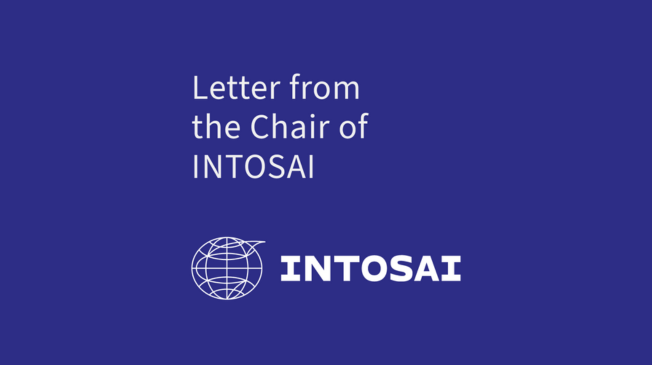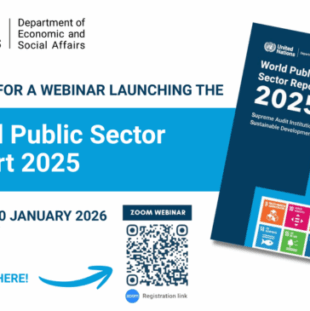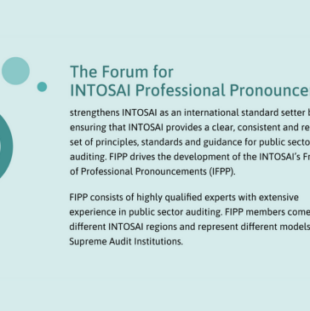Letter from the Chair of INTOSAI: The Key Role of Citizen Participation and Strong Supreme Audit Institutions in Building a Sustainable Future

The Chair of the International Organization of Supreme Audit Institutions (INTOSAI), Minister Vital do Rêgo, highlights the role of citizen participation and strong Supreme Audit Institutions in building a sustainable future.

Supreme Audit Institutions (SAIs) play a key role in promoting good governance, ensuring the efficient use of public resources, and the effectiveness of public policies for the benefit of citizens. The International Organization of Supreme Audit Institutions (INTOSAI) has been committed to amplifying the Global Voice of SAIs, reinforcing their independence and professionalism as key references in addressing major environmental and social challenges. We must continue this effort, recognizing that the complexities of global governance demand diligent action and closer engagement with the public.
In this context, citizen participation must be regarded as a cornerstone of oversight bodies. Engaging with society strengthens our mandates, fosters legitimacy, and enhances transparency. When citizens actively contribute to both the planning stages and the follow-up of audit recommendations, their voices are heard, and our actions are better aligned with the real needs of society.
By developing accessible channels, promoting public capacity-building, and leveraging innovative technologies, we equip citizens with tools to interact with SAIs and participate in decision-making and oversight processes. This approach democratizes access to information and reinforces institutional legitimacy. In this regard, the Brazilian Federal Court of Accounts (TCU), as Chair of INTOSAI, recognizes citizen participation as a global trend for institutions striving to uphold their credibility. Moreover, the TCU recently published the “Citizen Participation Framework” (Referencial de Participação Cidadã), which aims to integrate citizen engagement initiatives into audits while providing theoretical, legal, and practical guidance on strengthening and implementing participatory mechanisms.
At the INTOSAI level, it is important to highlight the Task Force on Citizen Participation and Civil Society Engagement (TFCP), which operates under the Capacity Building Committee (CBC). Led by SAI Peru, this task force seeks to identify and share best practices and develop tools and methodologies for their implementation. Another noteworthy initiative is the Citizen Participation Commission (CPC) within the Organization of Latin American and Caribbean Supreme Audit Institutions (OLACEFS), which promotes standardized policies and action plans to facilitate the cross-cutting execution of high-impact projects. This initiative enhances the exchange of experiences in the interaction between SAIs and citizens and has recently resulted in the publication of the Integrating Citizen Participation in OLACEFS Coordinated Audits guide (Incorporando la Participación Ciudadana en Auditorías Coordinadas de la OLACEFS).
Just as citizen participation is essential for SAIs at the local level, their role is also crucial in tackling pressing global challenges. Among them, climate change stands out—not only as an environmental concern but also as a factor affecting economies, food security, health, and social stability on a global scale. These challenges transcend borders and require a collective and coordinated response.
Recognizing this, the TCU published the Energy Transition Practical Guide for Supreme Audit Institutions, which highlights the role of SAIs in supporting global climate goals, such as the Sustainable Development Goals (SDGs) and the Paris Agreement. The guide provides audit-based methodologies and best practices to promote a sustainable and responsible energy transition.
The Brazilian city of Belém will host COP30, the 30th United Nations Climate Change Conference, from October 10-21, 2025. This landmark event will bring together world leaders to discuss and negotiate climate action. COP30 will be a unique opportunity to showcase the power of audits as a tool for sustainable development. Our institutions not only oversee but also ensure that the measures adopted are effective, responsible, and truly transformative.
The current scenario demands stronger audit institutions. Only by ensuring their independence, transparency, and accountability can we expand dialogue with audit partners, foster citizen participation, and consolidate SAIs as a bridge between society and good governance. Institutional strengthening also requires a commitment to innovation and excellence, continuously adapting oversight processes to meet evolving challenges.
With unwavering dedication and through broad and engaged participation within SAIs, we will continue advancing toward greater relevance and effectiveness. Together, we will work tirelessly to promote good governance and enhance societal well-being, inspiring positive and lasting change.






